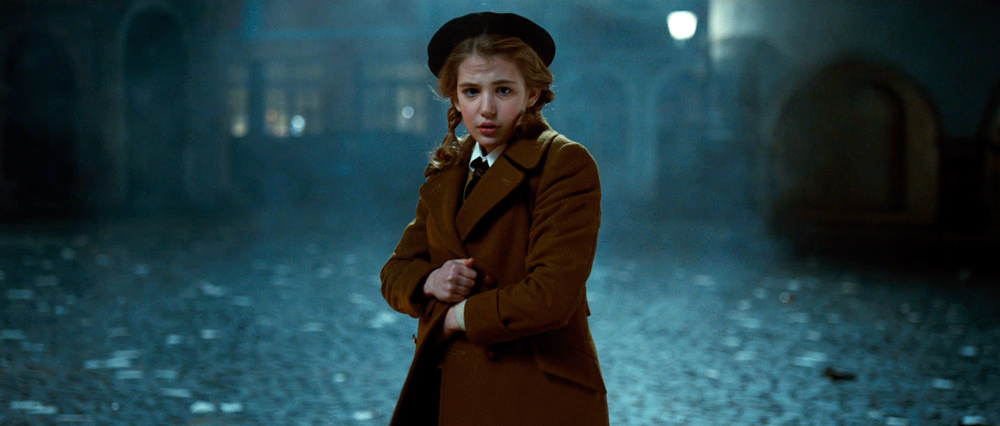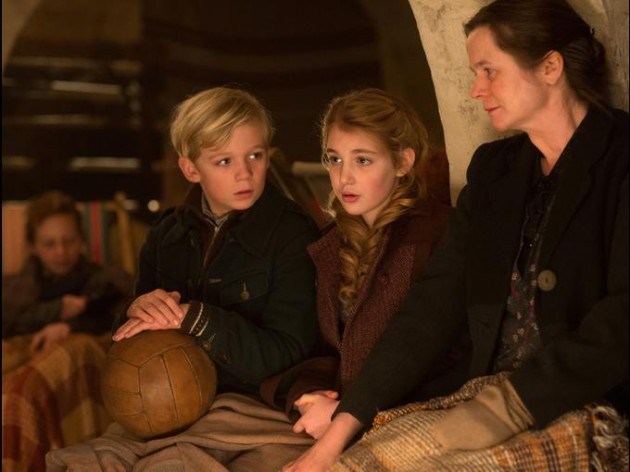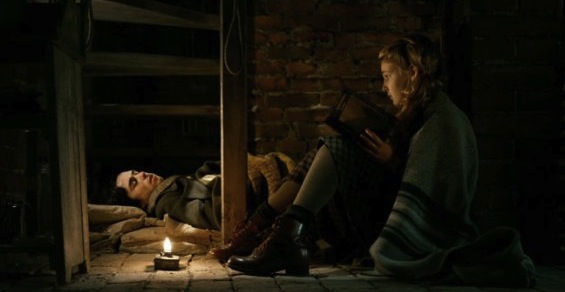The Book Thief opened quietly on Friday, a limited release oddly suited to this film’s gentle, handsome nature. Adapted from the highly decorated young adult bestseller by Marcus Zusak, The Book Thief captures much of the novel’s compelling, wide-eyed sensibility, while enriching it with the visuals only film can provide. Brian Percival directs, and he brings to the picture the steady hand and eye for historical detail that set him apart in his Emmy-winning work on Downton Abbey.
The Book Thief is a World War II story, and the novel has quickly taken its place between Number the Stars and The Diary of Anne Frank as a literary staple for children learning about the Holocaust. But to call The Book Thief a Holocaust movie is to do it a disservice. It chronicles the events in a small German town from the rise of Nazism to its eventual liberation by the Allies, yet its focus is never on the politics or prejudices that so often define fiction centered on that era. Rather, The Book Thief is a small, intimate story. It is about family, about childhood, kindness, loss, and power of story.
Those who have read Zusak’s original work may be concerned with certain crucial elements that are difficult to translate to film—namely, the narration by Death himself, and the focus on young children. In the novel, Death serves as narrator, educator, and confidante, guiding the reading through the story with humor and dry pathos. As a film narrator—in voiceover by Roger Allam—the effect is much diluted, and Death serves more as expository bookend than integral character. Nevertheless, it is to screenwriter Michael Petroni’s credit that the narrative voice wasn’t cut altogether, an easier choice which certainly would have been blasted by the book’s fans.
As for the young children—after seeing the movie, any concern seems laughable in retrospect. Sophie Nélisse is mesmerizing as Liesel, the film’s protagonist and the eyes through which we witness the events of a small town in Nazi Germany. Thirteen-year-old Nélisse, a French-Canadian actress, is a true find, her large expressive eyes capturing and reflecting the love and pain around her. The like-aged German actor Nico Liersch is a genuine delight as her best pal Rudy, and the pair’s friendship is both completely adorable and surprisingly mature.
The adult foundation of the cast rests with Geoffrey Rush and Emily Watson as Hans and Rosa Hubermann, Liesel’s adoptive parents. The two seasoned actors provide formidable performances that deeply ground the film. Rush is a fountain of warmth and paternal strength as Hans, and his scenes with Nélisse give the movie the tenderness that makes it a true family film. Watson’s Rosa is the stepmother whose hard edges and sharp tongue give way to a woman full of pain, empathy, and love. Yet these descriptions are only loose skeletons on which Watson and Rush have built. Hans and Rosa are richly developed, intensely watchable characters.
The tension of the surrounding war situates itself squarely the living room of the Hubermanns when a young Jewish fugitive named Max (Ben Schnetzer) finds his way to their doorstep. As Max is the son of a close friend of Hans, the Hubermanns hide and shelter the ailing Max, and Liesel develops an intimate friendship with the bright-eyed young man in her basement. Relative newcomer Schnetzer is brilliantly cast as the sparkling, soulful Max, who teaches Liesel about the power of language and paints the pages of a copy of Mein Kampf white so that she might write her own story.
At just over two hours long, The Book Thief isn’t a light film by any means, but its young protagonists and wholesome themes make it a classic family movie. But don’t be misled by Nélisse’s innocent blue eyes — this film is rooted in death, loss, and sacrifice. There are no fluffy clouds or Disney-esque history-washing. In the end, what gives The Book Thief its weight is its commitment to its subject matter, and the solemnity and maturity with which it treats the children that live it.This is a hardworking film.
The Book Thief has opened virtually unnoticed, although it has had a solid box office performance propelled largely by word-of-mouth and fans of the book. The real question will be whether Percival’s adaptation will slip into the running at the Academy Awards as a potential Oscar underdog. Rush and Watson’s performances are certainly deserving of nominations, and the cinematography, costuming, and score (by Hans Zimmer, no less), will hopefully not go overlooked. Yet with giants like 12 Years a Slave and Gravity in the mix, a straightforward, simpler film like The Book Thief is likely to be passed on. This isn’t a knock on the film’s quality—rather, this is a movie worthy of quiet longevity, one that will undoubtedly remain in the hearts and minds of viewers—and on their shelves—for a long time to come.




